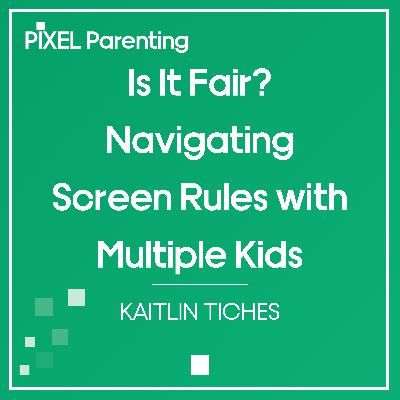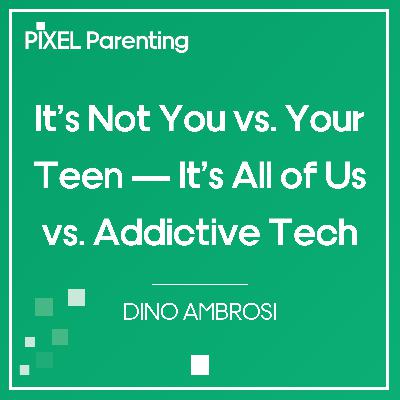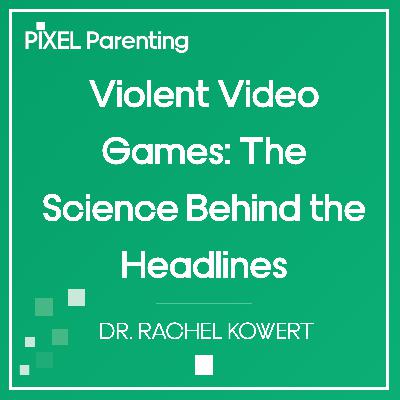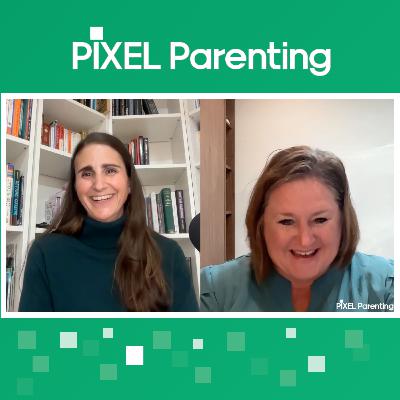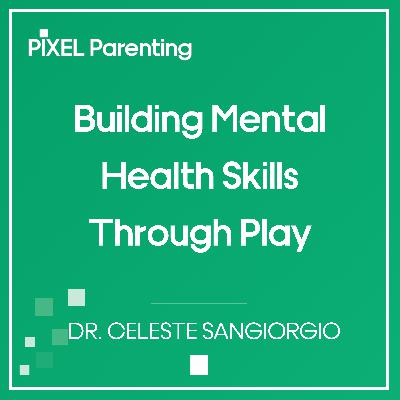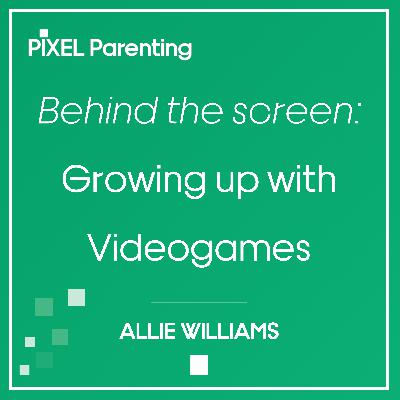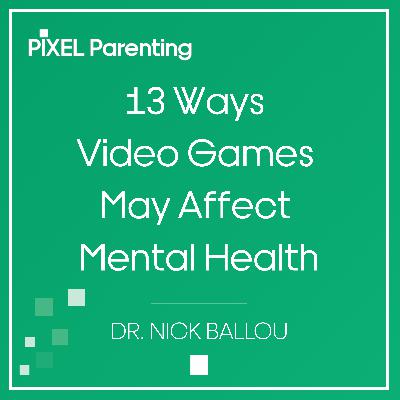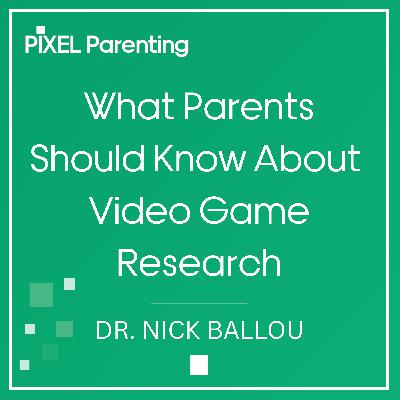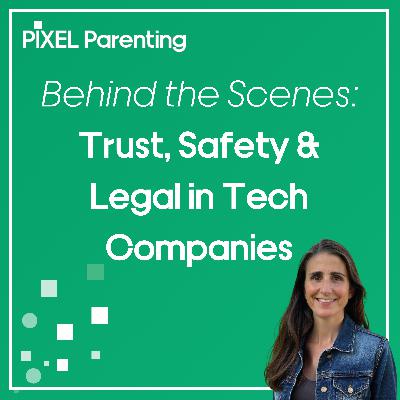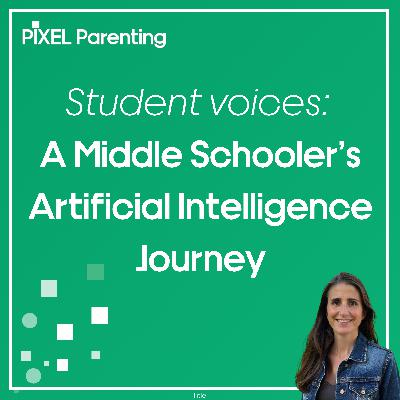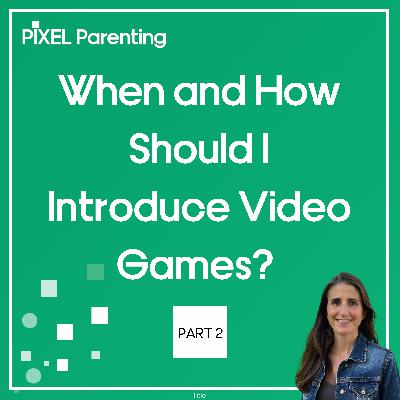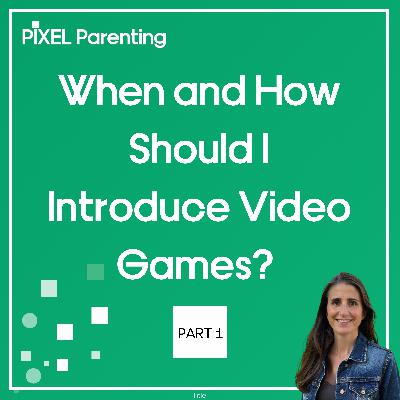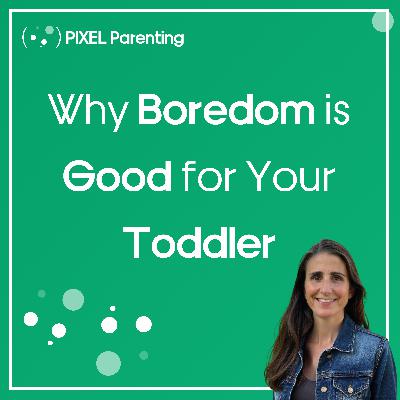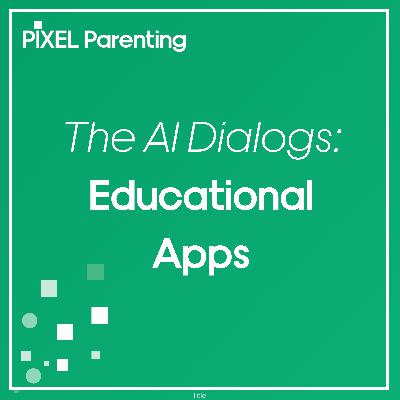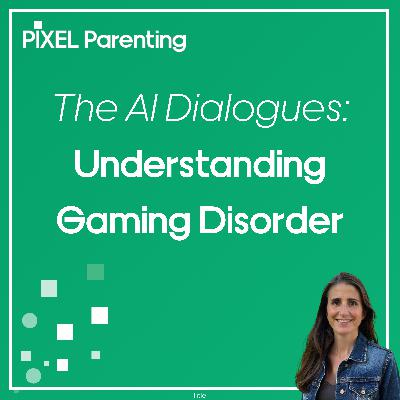Discover Pixel Parenting
Pixel Parenting

Pixel Parenting
Author: Patricia Cangas
Subscribed: 2Played: 26Subscribe
Share
© Patricia Cangas
Description
Pixel Parenting is your weekly guide to raising tech-savvy, balanced kids. Hosted by Patricia Cangas Rumeu, a mum and a seasoned expert in digital literacy and educational technology, this podcast aims to empower parents to guide their kids’ tech use confidently and thoughtfully. From screen time to educational apps, join us to explore tools and insights that help kids—and parents—build healthy digital habits.
Listen to our trailer and subscribe to stay updated!
Listen to our trailer and subscribe to stay updated!
23 Episodes
Reverse
Which parental mediation strategy does research say works best—and why?Patricia Cangas sits down with Kaitlin Tiches, a research librarian at Boston Children's Hospital and the Digital Wellness Lab, who translates the latest media research into practical guidance for families. Kaitlin unpacks parental mediation strategies—from active conversations to co-viewing and boundary-setting—and tackles real challenges like sibling fairness and bedroom device rules. "Our number one suggested rule is screens outside of the bedroom," she emphasizes. This episode delivers research-backed approaches parents can implement immediately, including autonomy-supportive mediation and why young people themselves are demanding better digital literacy education.
In This Episode:
(00:00) What a research librarian does to help parents navigate contradictory media studies
(05:22) Understanding parental mediation and the three research-backed approaches
(08:41) Handling different-age siblings when screen rules feel unfair
(13:53) Why bedroom device bans matter and how to explain the rule to kids
(20:38) What parents need to know about kids using AI tools
(29:26) The one change every family should make this week
(31:03) Why young people are demanding a seat at the digital wellness table
Share with someone who would benefit, like and subscribe to hear all of our future episodes!
About the Show
Patricia Cangas Rumeu, a seasoned expert in digital literacy and educational technology, hosts Pixel Parenting - where she empowers busy parents to navigate their kids' tech use with confidence and science-based insights. This bi-weekly podcast cuts through digital parenting confusion by exploring everything from screen time strategies to educational apps with expert guests and practical tools. Patricia combines her background as both a mother and technology educator to help families build healthy digital habits that work for real life, creating a community where parents can learn what being "tech-savvy" really means for kids today.
Resources:Digital Wellness Lab Website https://digitalwellnesslab.org Main hub for accessing all research, guides, and resources mentioned in the episode.
Kaitlin Tiches on LinkedIn https://www.linkedin.com/in/kaitlin-tiches/ Connect with Kaitlin directly and follow her work.
Family Digital Wellness Guide https://digitalwellnesslab.org/family-digital-wellness-guide/ Comprehensive guide separated by developmental stage with parenting practices, trends, and age-appropriate strategies.
Family Guides Collection https://digitalwellnesslab.org/family-guides/ Additional topic-specific guides for families navigating digital wellness challenges.
Pixel Parenting Digital Resources: https://pixelparenting.org/digital-education-resources/Pixel Parenting Podcast: https://pixelparenting.org/podcast/Pixel Parenting Facebook: https://www.facebook.com/profile.php?id=61553247026258Pixel Parenting IG: https://www.instagram.com/pixel...
Could reframing one conversation turn your teen from defensive to collaborative about screen time?Host Patricia Cangas talks with Dino Ambrosi, founder of Project Reboot, who turned his college struggle with phone addiction into a program now reaching over 50,000 students. Dino walks through surprising data showing 70% of teens at top schools self-identify as addicted to their phones, why banning devices without student buy-in often backfires, and practical strategies parents can start tonight. "We get addicted to escaping discomfort through seeking distraction," he explains. His biggest recommendation? Stop approaching tech time as you versus your teen—it's all of us versus addictive technology designed to keep everyone hooked.
In This Episode:
(00:00) An Instagram addiction in college led to the creation of Project Reboot
(05:20) Shocking poll results show 70% of teens at top schools feel addicted to their phones
(08:52) Why bell-to-bell phone bans can backfire and create underground magnet black markets
(20:53) How to start the conversation without making it you versus your teen
(25:08) Three simple changes parents can try this week to reduce family screen time
Share with someone who would benefit, like and subscribe to hear all of our future episodes!
About the Show
Patricia Cangas Rumeu, a seasoned expert in digital literacy and educational technology, hosts Pixel Parenting - where she empowers busy parents to navigate their kids' tech use with confidence and science-based insights. This bi-weekly podcast cuts through digital parenting confusion by exploring everything from screen time strategies to educational apps with expert guests and practical tools. Patricia combines her background as both a mother and technology educator to help families build healthy digital habits that work for real life, creating a community where parents can learn what being "tech-savvy" really means for kids today.
Resources:ClearSpace - Free app for students that creates pauses before opening distracting apps, with social accountability features: https://www.clearspace.app/
ScreenZen - Free app (tipping model) for managing app usage with intentional delays, good Android option: https://screenzen.com/
Grayscale mode - Built-in iPhone setting that reduces screen appeal (Settings > Accessibility > Color Filters > Grayscale)
Notification Audit - Review and limit phone notifications to only urgent matters (Settings > Notifications)
Dino Ambrosi TEDx talk: https://www.youtube.com/watch?v=4TMPXK9tw5U
Dino Ambrosi Website:...
What do Minecraft, D&D, and Fortnite actually teach your child's developing brain?Dr. Kelli Dunlap, a licensed clinical psychologist with a master's in game design and executive director of Take This, joins us to explore video games as tools for learning and development. Dr. Dunlap explains why humans play, what games teach children at different ages, and how parents can distinguish healthy gaming from problematic patterns. She walks through practical strategies for managing screen time transitions, teaching emotional regulation through gameplay, and using curiosity instead of judgment when engaging with kids about their digital lives. "All games teach—whether or not it's what you want your kid to learn is a different story," Dr. Dunlap explains, reframing gaming as an opportunity rather than a threat.
In This Episode:
(00:00) Dr. Dunlap - from psychology doctorate to game design degree
(05:22) Why humans are hardwired to play and what makes games uniquely powerful for learning
(10:27) What your child actually learns from Minecraft, Fortnite, and tabletop games
(19:55) The difference between healthy and unhealthy relationships with gaming
(26:34) How to handle the moment when gaming time ends and your kid refuses to stop
(33:05) Why completely avoiding tablets might actually put kids at a disadvantage
(37:53) The new generation of therapists using games in clinical practice
(40:21) Three essential tips every parent needs about gaming and mental health
Share with someone who would benefit, like and subscribe to hear all of our future episodes!
About the Show
Patricia Cangas, a seasoned expert in digital literacy and educational technology, hosts Pixel Parenting - where she empowers busy parents to navigate their kids' tech use with confidence and science-based insights. This bi-weekly podcast cuts through digital parenting confusion by exploring everything from screen time strategies to educational apps with expert guests and practical tools. Patricia combines her background as both a mother and technology educator to help families build healthy digital habits that work for real life, creating a community where parents can learn what being "tech-savvy" really means for kids today.
Resources:
Take This, mental health nonprofit specifically serving game players and game developers: https://www.takethis.org/
Dr. Kelli Dunlap website://www.dunlappsyd.com/Halo series - https://www.halowaypoint.com/
Minecraft - https://www.minecraft.net/
Fortnit...
"Parents can be worried about all the other million things that we're worried about for our kids. But violent video games in and of themselves should not be at the top of that list." - Dr. Rachel Kowert Host Patricia Cangas sits down with Dr. Rachel Kowert, a psychologist and game researcher whose work has appeared in The New York Times and Wall Street Journal. Dr. Kowert founded the Psychgeist YouTube channel and podcast to make game science accessible to the public. She tackles the persistent myth linking violent games to real-world violence, explaining how decades of research show no direct connection. "We've done this research, we've put millions of dollars of research funding into this to look at those links and we just don't see them," she explains. Parents learn practical ways to evaluate games beyond ratings and foster healthy gaming conversations with their kids.
In This Episode:
(00:00) Intro and why this topic stays in the headlines
(02:19) The plot twist: what the evidence actually shows
(05:15) Population trends vs crime: why correlation claims fall apart
(10:18) Beyond ratings: how parents can vet games in the real world
(15:35) Bro talk, gamer culture, and house rules
(18:08) Why social context matters more than pixel violence
(19:28) Why we play: motivations and social pull
Share with someone who would benefit, like and subscribe to hear all of our future episodes!
About the Show
Patricia Cangas Rumeu, a seasoned expert in digital literacy and educational technology, hosts Pixel Parenting - where she empowers busy parents to navigate their kids' tech use with confidence and science-based insights. This bi-weekly podcast cuts through digital parenting confusion by exploring everything from screen time strategies to educational apps with expert guests and practical tools. Patricia combines her background as both a mother and technology educator to help families build healthy digital habits that work for real life, creating a community where parents can learn what being "tech-savvy" really means for kids today.
Resources:
Dr. Rachel Kowert:
Dr. Rachel Kowert Website: https://rkowert.com
Psychgeist Podcast: https://rkowert.com/psychgeist/#podcast
Psychgeist YouTube: https://www.youtube.com/psychgeist
Games We Talked About (With Links!) These are some of the games the guest mentioned, along with links so you can explore them:
Mortal Kombat – Fighting game series known for realistic violence and fatalities:https://www.mortalkombat.com/
Grand Theft Auto (GTA) – Open-world action game series: https://www.rockstargames.com/gta-v
Call of Duty – Military first-person shooter series:
Episode Summary
Pediatric speech-language pathologist Denise Santos Ford, M.S., CCC-SLP joins Pixel Parenting to demystify what SLPs actually do (far beyond “fixing R’s”), how screen time intersects with social-emotional and language development, and practical, evidence-aligned ways parents can use tech—together with their kids—to spark more words. We also talk AAC devices, video-modeling, telehealth vs. in-person therapy, ultrasound biofeedback for tricky sounds, and emerging AI tools that may support home practice.
What We Cover
What SLPs treat beyond articulation and stuttering: phonology, motor planning/apraxia, social-pragmatic language, literacy (reading/writing), cognition, and feeding/swallowing.
What research suggests about screen exposure, social-emotional development, and why co-viewing with a caregiver matters.
Turning apps and shows into language prompts (not babysitters): used together to model vocabulary, emotions, and conversation.
Assistive tech & AAC: giving kids a voice while speech develops; when and how SLPs trial apps/devices.
Home practice that sticks: video-modeling, self-monitoring, and level-by-level targets.
Telehealth vs. in-person: what works, what’s harder, and the role of caregiver coaching.
Tools for tricky sounds: delayed auditory feedback, visual meters, and ultrasound to “see” the tongue for /k, g, r/.
AI on the horizon: supervised home practice and feedback loops from university research teams.
Denise’s Practical Tips (Quick Wins)
Co-view and narrate: pause, label feelings, predict, and relate on-screen moments to your child’s day.
Use apps together as conversation starters (not solo time): describe, compare, decide, and reflect.
Match the practice level: at home, stay one level below what the SLP is targeting to ensure success and carryover.
Try video-modeling: record, rewatch, notice small mouth-movement tweaks, then try again.
Resources & Links Mentioned
Toca Boca — https://tocaboca.com/
Toca Boca World – App Store — https://apps.apple.com/us/app/toca-boca-world/id1208138685
Toca Boca World – Google Play — https://play.google.com/store/apps/details?id=com.tocaboca.tocalifeworld
ABCya — https://www.abcya.com/
ABCya – Google Play — https://play.google.com/store/apps/details?id=com.abcya.android.games
PBS KIDS Games Hub — https://pbskids.org/games
PBS KIDS – Home — https://pbskids.org/
Boom Learning (Boom Cards) — https://www.boomlearning.com/
Speech Blubs — https://speechblubs.com/
Speech Blubs – App Store — https://apps.apple.com/in/app/speech-blubs-language-therapy/id1239522573
Speech Blubs – Google Play — https://play.google.com/store/apps/details?id=org.blubblub.app.speechblubs
Articulation Station (Little Bee Speech) — https://littlebeespeech.com/articulation_station.php
Articulation Station Hive – App Store — https://apps.apple.com/us/app/articulation-station-hive/id1485607474
Bla Bla Bla – App Store (sound‑reactive) — https://apps.apple.com/us/app/bla-bla-bla/id430815432
Ultimate SLP — https://www.ultimateslp.com/
Learning Ally (audiobooks for dyslexia) — https://learningally.org/
ASHA – American Speech‑Language‑Hearing Association — https://www.asha.org/
Syracuse University – Speech Production Research Lab — https://speechproductionlab.syr.edu/
Speech Motor Chaining (research site) — https://chaining.syr.edu/
Rachel – Songs for Littles (YouTube) — https://www.youtube.com/@msrachel
Dora the Explorer – Nickelodeon — https://www.nickanimation.com/content/dora-the-explorer/
Mickey Mouse Clubhouse – Disney+ — https://www.disneyplus.com/browse/entity-eb0bb177-6278-48ec-902d-4efb916a...
In this episode of Pixel Parenting, I talk with Julianna Lorenzen, co-founder of Healthy Screen Habits, about how screens shape kids’ brains, and what we can do about it.
Julianna has a background in sports medicine and is also a mom of four. She shares how her medical expertise and parenting journey led her to co-found a nonprofit that helps families navigate tech use with science, compassion, and practical tools. We cover the brain science behind screen habits, what makes apps so addictive, and five habits every family can use to build a healthier relationship with technology.
Whether you’re just starting to think about screen time or already deep in the trenches, this episode will give you tools, and hope.
In this episode, we talk about:
Why understanding brain development changes how we parent with tech
How persuasive design and attention economy are hijacking our kids’ attention
The difference between our screen habits and theirs—and why both matter
How to talk to your kids (and grandparents!) about screens
Why it’s never too late to make a change, even if the phone is already in the bedroom
Resources & Links we Mention:
✅ Healthy Screen Habits Website
So many great resources to learn, reflect, and take action:
https://www.healthyscreenhabits.org
Free Tools You Can Download
Family Technology Plan (English & Spanish)
Five Core Healthy Screen Habits
“What to Do When You’re Feeling Meh” – great for helping kids with emotional regulation
Book: Healthy Screen Habits for Tweens & Teens:. It’s colorful, easy to read, and packed with science and conversation starters—perfect for reading with your kids. Find it on Amazon
Healthy Screen Habits Podcast
There’s an entire episode library organized by topic—so helpful.
Podcast...
In this conversation, Dr. Celeste Sangiorgio discusses the intersection of video games and mental health, exploring how gaming can be utilized as a therapeutic tool. She shares insights on designing games that address mental health challenges, the importance of narrative in engaging players, and how games can influence identity development and empathy. The discussion also touches on parenting styles as represented in games, the potential for games to foster conversations between parents and children, and the future of gaming in mental health advocacy.
Takeaways
Dr. Celeste Sangiorgio focuses on translating cognitive behavior therapy concepts into game environments.
Games can help build awareness of emotions and improve communication skills.
Narrative games can effectively teach mental health skills in an engaging way.
Video games influence identity development and self-perception in children and teens.
Moral decision-making in games allows players to explore different perspectives.
Parenting styles in games reflect real-life caregiving dynamics.
Games can serve as conversation starters between parents and children.
Research in gaming and mental health is rapidly evolving and promising.
Effective communication with children about gaming can enhance their understanding and development.
Resources & Links Mentioned
Celeste Sangiorgio’s Website
MindLight – a biofeedback game designed to help children manage anxiety: MindLight Overview (Games for Change)
Psychgeist Series by Dr. Rachel Kowert: https://rkowert.com/psychgeist/
A Parent’s Guide to Video Games by Rachel Kowert: https://rkowert.com/books/
Games mentioned: Donkey Kong, The Legend of Zelda: A Link to the Past, Final Fantasy VII, The Witcher, Mass Effect, Dragon Age, God of War, Metal Gear Solid
Follow Us
Show notes & more at pixelparenting.org
Instagram: @pixelparentingtips
Don’t forget to follow or subscribe wherever you get your podcasts!
In this conversation, Allie shares her journey through the world of gaming, discussing her educational background in game design and neuroscience, the impact of video games on her life, and how they have helped her manage ADHD. She emphasizes the importance of parental guidance in navigating online gaming safety and the role of trust in the parent-child relationship. Allie also highlights the potential of educational games and the future of gaming for families, encouraging young creators to explore their passion for game development.
Takeaways
Games can be a great way to exercise the brain.
Understanding game design can enhance player experience.
Video games can positively impact friendships and social connections.
Games can help manage ADHD by providing structured breaks.
Parental involvement is crucial in guiding children's gaming habits.
Trust between parents and children is essential for healthy gaming habits.
Games can foster creativity and critical thinking skills.
The gaming industry is becoming more accessible for young creators.
Balancing gaming with other activities is key to healthy habits.
Games We Talked About (With Links!)
These are some of the games Allie mentioned, along with links so you can explore them:
Relaxing or Educational Games for Younger Kids:
Animal Crossing: New Horizons (E) – cozy, creative, and educational
Professor Layton series (E10+) – great for logic and critical thinking
Blueprints (E, but better for teens) – beautiful and challenging puzzles
Great for Family Bonding and Strategy:
Grounded (E10+) – a backyard survival game, perfect for co-play
Escape Simulator (T) – cheaper than a real escape room, fun for teens
Sid Meier’s Civilization VI (E10+) – rich in history and strategic thinking
Portal 2 (E10+) – brilliant for problem-solving and communication
Allie’s Personal Favorites for Learning and Self-Regulation:
Shovel Knight (E10+) – helped her structure study breaks
Cuphead (E10+) – hard but fun
In Part 2 of our special series with Dr. Nick Ballou, postdoctoral researcher at the Oxford Internet Institute, we dive into what research actually says about the effects of video games on mental health. Drawing from his newly published review paper, Dr. Ballou walks us through 13 potential ways gaming can influence well-being—from emotional regulation and social connection to displacement.
We also dig into common myths (no, violent games don’t turn kids violent), talk about when parents should worry (and when they can relax), and explore how context—not just screen time—shapes the impact of games.
Whether you’re raising a passionate gamer or just trying to figure out how to set healthy boundaries, this episode is full of research-backed insights and practical tips.
In This Episode:
A breakdown of the 13 proposed effects video games may have on mental health
Why screen time alone isn’t a useful measure
How games can support (or hinder) emotional regulation, social bonding, and identity development
The risks of overreliance and displacement of core life activities like sleep, schoolwork, and social time
When to worry, and how to start meaningful conversations with your kids about gaming
Key Takeaways:
Games can help kids regulate emotions, feel connected, and explore identity—but can also displace sleep, social life, or academic focus if overused
The same game can help one child thrive and another struggle; it all depends on the context, player, and game
Building media literacy and reflection—through open conversation or even a simple gaming journal—can empower kids and parents alike
Don’t panic about “gaming disorder” checklists; many so-called red flags (like thinking about games often) can be neutral.
Ask your kids: Why do you play? How does it make you feel? What would you be doing instead?
Links & Resources:
Dr. Nick Ballou's website: https://nickballou.com
How do video games affect mental health? A narrative review of 13 proposed mechanisms
Want to Contribute to the Research?: Register your interest here
In this first part of a two-part series, I sit down with Dr. Nick Ballou, a postdoctoral researcher at the Oxford Internet Institute, to pull back the curtain on how video game research is actually done.
You’ve seen the headlines—video games are either harming or helping our kids—but what’s the truth behind those claims? Dr. Ballou explains the difference between self-reported survey data and behavioral data, what it takes to collaborate with the gaming industry, and why understanding the how behind the science is crucial for parents.
We also explore surprising findings—like how gaming time isn’t the best predictor of well-being—and why curiosity and conversation are the most powerful tools parents have.
Show Notes:
Guest: Dr. Nick Ballou, Postdoctoral Researcher, Oxford Internet Institute
Episode Length: ~25 min
Topics Covered:
How video game research is typically conducted
The limitations of survey-based studies
What behavioral data offers—and why it’s hard to get
Collaborating with gaming companies like Nintendo and Xbox
Why screen time alone doesn’t tell the full story
The power of media literacy and engaged parenting
Key Takeaways:
Behavioral data gives a more nuanced and trustworthy view of gaming impacts than surveys alone.
Time spent gaming doesn’t predict well-being—context and quality of play matter more.
Kids thrive when parents stay curious, ask questions, and understand why and what they’re playing.
Much of the research we see in headlines oversimplifies complex realities.
Links & Resources:
Dr. Ballou’s research
Want to Contribute to the Research?: Register your interest here
Stay Connected:
Subscribe to Pixel Parenting on your favorite podcast app
Follow us on Instagram @pixelparenting
Share this episode with a friend or parenting group
Next Episode Teaser:
In Part 2, Dr. Ballou walks us through 13 ways video games may impact mental health—some helpful, some harmful, and all more complex than a headline.
In this episode of Pixel Parenting, we dive into the critical early years of child development with Rebecca Walsh, founder of Early Childhood Matters. Rebecca shares how the first five years shape a child’s brain, why presence and connection are more powerful than we think, and how even small habits—like looking up from our phones—can make a big difference.
We talk about what “serve and return” really means, the science behind early brain development, and how modern parenting is being shaped by digital distractions. Plus, we explore how screen time affects kids under three, why boredom matters, and what happens when children lose opportunities for real-world connection and play.
Rebecca also shares practical strategies for building connection—even just 10 minutes a day—and offers tips on managing tech as a busy parent in today’s fast-paced world.
✨ Special Listener Offer:
Rebecca is offering Pixel Parenting listeners 10% off any of her on-demand parenting workshops or in-person mom groups!
Use the code pixelparenting10 at checkout.
Explore the programs here:
On-demand workshops: https://www.earlychildhoodmatters.org/on-demand-offerings
New Mama Groups (First/Second Time Moms): https://www.earlychildhoodmatters.org/newmamas
Junior Explorers (Nature Program): https://www.earlychildhoodmatters.org/junior-explorers
Summer Camps: https://www.earlychildhoodmatters.org/summer-camp
In this episode I’m excited to welcome Abby Vollmer—a legal and policy expert in the tech industry with a wealth of experience from GitHub, Strava, and now Cloudflare. In our conversation, Abby dives into her work at the intersection of technology, law, and child safety, exploring how tech policies shape everything from data management to community guidelines that protect our kids online. We discuss the evolving role of trust and safety teams in adapting to rapid technological change and the challenges lawmakers face in creating regulations that keep pace with innovation.
Throughout our discussion, Abby shares real-world examples from her career, illustrating how legal insights and clear policy design are crucial for building safer digital environments. She explains how companies navigate the complex web of international regulations and why many opt to implement the most stringent standards across the board. Together, we also explore practical tips for parents—like scrutinizing privacy settings and understanding community guidelines—so you can feel more empowered to guide your children through the digital world. Whether you’re a parent or just curious about how technology and law intersect to protect our kids, this episode offers valuable insights and actionable advice.
In this episode we explore the evolving role of AI in education through the eyes of Valentin, a tech-savvy seventh grader. Valentin recounts his early encounters with AI - starting with tools like DALL-E and ChatGPT - and how he now uses these technologies to overcome challenges such as dyslexia and ADHD. He explains how AI aids him in homework, streamlines group projects, and even sparks creative ideas for school assignments. While sharing his successes, Valentin also discusses the challenges of relying on AI, such as ensuring accuracy and the risk of misuse in academic settings. This open conversation offers a fresh perspective on integrating technology in learning, highlighting both the exciting opportunities and the responsibilities that come with embracing AI in the classroom and at home.
In Part 2, I focus on practical strategies for introducing and managing video games at home. I explain how creating a simple gaming contract and using parental controls can help set clear, balanced schedules for play, homework, and other activities. I also highlight the benefits of co-playing—showing that setting limits is important for both kids and adults—and break down how dopamine works in the brain, reinforcing the need to balance gaming with other rewarding pursuits. Finally, I share my personal approach and tips, like keeping a gaming journal and maintaining open communication, to help your children build healthy self-regulation skills.
In this episode of Pixel Parenting, I kick off a special two-part series on introducing video games to children.
In Part One, I share when it’s the right time to start gaming—covering age guidelines and developmental milestones, from avoiding screens for infants to using simple, educational games for preschoolers, and gradually increasing playtime as children grow older. I also discuss the importance of balancing gaming with activities like outdoor play, reading, and creative hobbies, and explain how to evaluate game content using tools like ESRB, PEGI, and Common Sense Media. I share my own journey—from my college days of being hooked on World of Warcraft to enjoying RPGs like Baldur’s Gate 3 with my husband—emphasizing that if your child isn’t naturally drawn to video games, there’s no need to force it. Join me as I dive into expert recommendations and practical strategies for helping your kids navigate our digital world thoughtfully.
In this episode of Pixel Parenting, I take you on a dive into the unexpected power of boredom for toddlers. I share how those seemingly idle moments can be transformed into golden opportunities for sparking creativity, building emotional resilience, and nurturing independence in our little ones.
Here’s what I cover in this episode:
• The Psychology of Boredom: I explain why boredom isn’t just a void of activity but an emotional state that, when embraced, can ignite creative problem-solving and enhance cognitive flexibility.
• Unleashing Toddler Creativity: I share real-life examples of how toddlers turn everyday objects into imaginative play—think of a simple cardboard box transforming into a spaceship, castle, or fort!
• Building Emotional Resilience: I discuss how those moments of mild frustration, when a toddler learns to self-soothe, serve as mini workouts for their emotional muscles.
• Practical Tips for Home and On-the-Go: I offer actionable advice on creating safe, exploratory play spaces at home, rotating toys to maintain novelty, and using creative strategies to manage boredom during car rides.
• Balancing Technology: I also explore how and when to use tech as a backup on long trips while ensuring screens don’t become the default solution to boredom.
Additional Resources & Links:
• Visit my website for more articles, research insights, and practical parenting tips.
• Join me on X and Instagram to connect with a community of parents who are also rethinking boredom and creativity.
I’d love to hear your thoughts and stories on how you turn boredom into an opportunity at home or on the go. Feel free to reach out to me at contact@pixelparenting.org or leave a comment on my website. Let’s start a conversation and learn from each other as we transform everyday parenting challenges into moments of creative growth.
Tune in and join me in reframing boredom as a vital tool in our toddlers’ developmental journey.
Are all “educational” apps created equal? In this episode, we dive into the world of apps designed for kids, exploring how to separate the genuinely educational from the flashy distractions. With over 80,000 apps labeled “educational,” how can parents make informed choices? Tune in as we discuss tips, tools, and research to guide you through the digital maze. Perfect for parents, educators, and anyone curious about technology’s role in learning!
Join Patricia and Sarah, an AI, on a discussion into the fascinating and complex world of gaming habits. This episode explores the science behind gaming disorder, the criteria used for diagnosis, and how to recognize the signs of excessive gaming. Through relatable anecdotes and insightful discussions, you'll gain a better understanding of when gaming becomes more than just a hobby.
Perfect for gamers, parents, and anyone curious about the psychology of gaming. Tune in for an engaging conversation that blends personal experiences with expert insights!
Here’s a fun little song made by AI to brighten your day. No deep parenting insights here—just some lighthearted, tech-inspired fun for your day!
Using Brev.ai’s Royalty Free Music Generator.
Welcome to Pixel Parenting, your go-to podcast for science-backed insights and practical tips on navigating the complex digital world with your children. Created by Patricia Cangas Rumeu, a seasoned expert in digital literacy and educational technology, this podcast aims to empower parents to guide their kids’ tech use confidently and thoughtfully.
With a Master’s degree in Education focused on neuroscience and technology, Patricia draws from over 15 years in the tech industry, alongside her experience as a parent and digital literacy advocate, to bring you the latest research and strategies. Through engaging conversations, evidence-based insights, and actionable advice, Patricia helps parents build healthy digital habits for kids that last a lifetime.
Join us as we explore topics like balanced screen time, educational apps, gamification for learning, and creating tech boundaries that work. Whether you're a seasoned digital parent or just beginning to navigate this journey, Pixel Parenting has something for everyone.
Listen to our trailer to learn more, and subscribe for your weekly dose of tech-savvy parenting tips!


